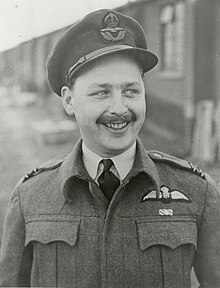John Freeborn
| John Connell Freeborn | |
|---|---|

Squadron Leader John Freeborn, c. 1944
|
|
| Born |
1 December 1919 Middleton, Yorkshire |
| Died | 28 August 2010 (aged 90) Southport, Merseyside |
| Allegiance |
|
| Service/branch |
|
| Years of service | 1938–1948 |
| Rank | Wing commander |
| Service number | 70854 |
| Unit |
No. 74 Squadron RAF No. 602 Squadron RAF |
| Commands held |
No. 118 Squadron RAF No. 286 Wing RAF |
| Battles/wars | |
| Awards | Distinguished Flying Cross & Bar |
| Other work | Regional Director for their Minster Minerals soft drinks Author |
Wing Commander John Connell Freeborn DFC & Bar (1 December 1919 – 28 August 2010) was a fighter pilot and flying ace in the Royal Air Force (RAF) during the Second World War. He was not only an ace, but also held the distinction of having flown more operational hours than any other RAF pilot during the Battle of Britain.
Freeborn was born in Middleton, these days a suburb of Leeds within the city's ring-road, then an area of open farmland.
His father Harold was a branch manager with the Yorkshire Penny Bank (now Yorkshire Bank), and he was something of a disciplinarian at home. Freeborn remembered that his mother Jean (née Connell) was a stern woman, saying 'I never saw her smile'. He had five siblings, two sisters and three brothers.
They moved to Headingley when Freeborn was still an infant. He later attended Leeds Grammar School and, although a bright and confident pupil, his dislike of petty authority made him glad to leave as soon as possible.
Later, during the war, he borrowed a Gloster Gauntlet and flew up to revisit his alma mater, giving an aerobatic display before landing on the school cricket pitch. Freeborn described the irony of having the masters who, only a few years earlier, had berated and beat him telling a new crop of pupils what a shining example he was.
He joined the RAF on a short service commission in January 1938. In training, he was flying solo after only 4 hours 20 minutes logged flight time, a little over half the average; his accuracy at firing whilst in the air was more than twice the average. Commissioned as an acting pilot officer on probation on 26 March 1938 he initially flew Gloster Gauntlets, but in October 1938 he joined 74 Squadron, and from February 1939 flew Spitfires.
...
Wikipedia
